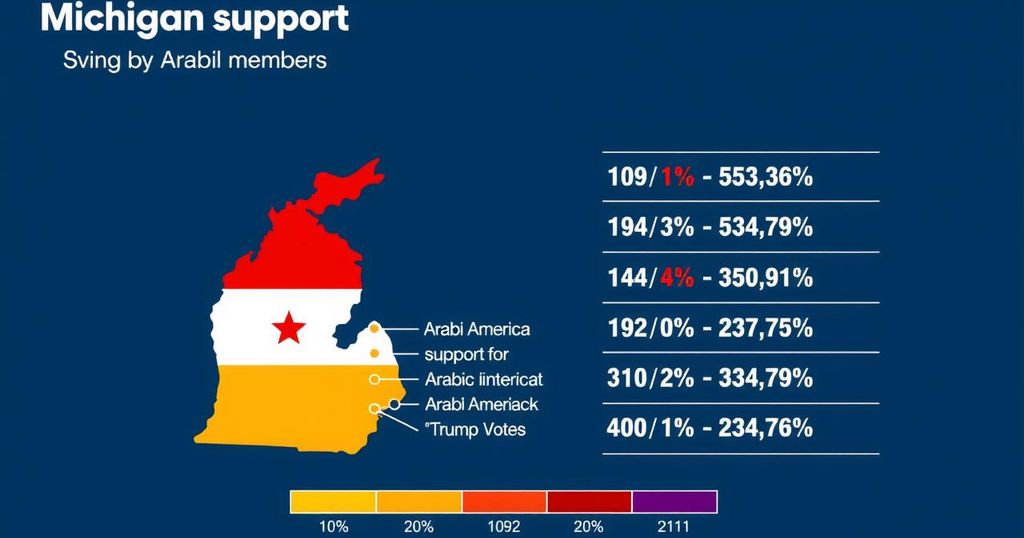Arab-Americans in Michigan Shift Towards Trump Amid Discontent with Democrats

Arab-Americans in Michigan are increasingly leaning towards Donald Trump in the upcoming election due to disappointment with the Democratic Party, especially in relation to policies affecting the Middle East. This shift reflects a broader sentiment of abandonment and highlights a critical voting bloc that could influence Michigan’s electoral outcome.
The evolving political landscape among Arab-Americans in Michigan presents a compelling instance of how voter sentiment can markedly shift in response to current events and perceived government actions. In recent interactions with the Arab-American community, a notable trend has emerged: a disillusionment with the Democratic Party, particularly towards figures like Vice President Kamala Harris, regarding their stances on international matters, particularly those concerning Gaza and Lebanon. A visit to Hamtramck and Dearborn, cities with significant Arab-American populations, reveals a striking pivot towards former President Donald Trump—a name often associated with anti-immigrant rhetoric and divisive policies. However, local sentiments suggest that many community members perceive Trump as a potential alternative amid a growing sense of abandonment by the Democrats. During conversations with first-time voters at Frontier International Academy, a Muslim-majority institution, students expressed skepticism towards the current administration’s ability to effect positive change. Eighteen-year-old Jubran Ali remarked, “We do not know what she [Harris] is going to provide; so I think it is just a safer bet to go for Donald Trump.” Similar sentiments were echoed by Edris Alhady, who conveyed that a considerable number of his peers are also favoring Trump. Amer Ghalib, the Democratic Mayor of Hamtramck, who previously embraced Biden, recently endorsed Trump. He articulates that the shift stems from a combination of disappointment towards the Democratic Party and a hope that Trump could bring about a different approach: “Disappointment that the current administration…and hope that the new administration…will do something different.” This candid reflection illustrates the complex interplay of local and international issues impacting voter decisions. Michigan, historically a prime battleground state, has seen significant shifts in its voting demographics. In the 2016 election, Trump was the first Republican to claim victory there since 1988, and in 2020, Biden secured a narrow win. The Arab-American community encompasses a critical voting bloc, underscoring the Democrats’ potential miscalculation in taking their support for granted. Local activist Samraa Luqman expressed her discontent with both parties yet remained resolute that Trump could be preferable in light of perceived injustices: “Policy-wise, I do not like any of the Republican policies… I will still vote for him because one thing I hate more than all those other policies is genocide… And that’s the sentiment of an entire community.” As the election approaches, the increasing engagement of Arab-Americans with Trump’s campaign signifies a response not solely rooted in foreign policy but also a deep-seated feeling of being sidelined in cultural conversations. Ghalib noted the lack of outreach from Harris’s team concerning community issues, asserting, “They think I am a fake Democrat.” Ultimately, the growing inclination towards Trump among Arab-Americans reflects wider national trends where marginalized communities express dissatisfaction with their traditional political alignment. Abdulhakim Alsadeh, a leader within the Yemeni-American community, remarked on this concerning movement, emphasizing the broader implications of such shifts beyond Michigan’s borders. The convergence of social, economic, and foreign policy issues forms the backdrop for a potentially significant realignment in voter preferences leading into election season.
The article discusses a surprising shift among Arab-American voters in Michigan, particularly their growing support for Donald Trump as dissatisfaction rises with the Democratic Party, especially regarding foreign policy related to the Middle East. The community, historically aligned with the Democrats, finds itself at a crossroads as local sentiment evolves against the backdrop of recent international events and a perceived lack of engagement from Democratic leadership, particularly Vice President Kamala Harris. Michigan serves as a vital state in the electoral process, with Arab-Americans constituting a key demographic that can influence the outcome of close races.
The political dynamics among Arab-Americans in Michigan illustrate a significant shift towards Donald Trump driven by disillusionment with the Democratic Party’s current leadership and policies. As community members vocalize their concerns about abandonment and cultural values, these developments point towards a potential realignment within the electorate that may have broader implications for future elections. This movement underscores the importance of engaging diverse voices in the political conversation to avoid alienation and ensure representation.
Original Source: news.sky.com







